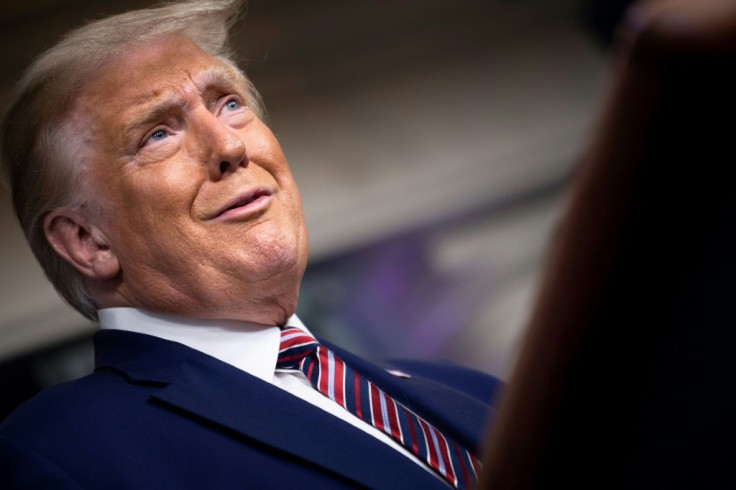Do Trump’s Tax Dealings Make Him A National Security Threat?
KEY POINTS
- Critics pointed to looming loans, the massive losses his business have suffered, and income from foreign and special interest groups as cause for concern
- Trump's taxes showed he received $73 million from foreign business ventures between 2017 and 2018, after taking office
- Critics said the combination makes Trump malleable to foreign interests who can exploit his financial woes to their own benefit
Since the New York Times published its report Sunday on President Donald Trump’s taxes from more than two decades, new questions emerged about what this means for the man who sold himself as a self-made billionaire.
One of the biggest questions being asked Monday: Do Trump’s tax troubles prove he is a national security threat?
The basis for this line of thinking is how Trump’s businesses have benefited since he took office in January 2017 amid his massive debt.
“In the 1990s, Mr. Trump nearly ruined himself by personally guaranteeing hundreds of millions of dollars in loans, and he has since said that he regretted doing so,” the New York Times report said. “But he has taken the same step again, his tax records show. He appears to be responsible for loans totaling $421 million, most of which is coming due within four years.”
Trump denounced the report as "fake news."
Trump’s tax returns also showed most of his major business ventures typically operating at a loss, contradicting the image of success Trump touted during his 2016 presidential campaign. Among the losses: $315 million on his golf courses since 2000 and $55 million the Trump International Hotel in Washington D.C.
The Times said one of the biggest reasons many of these business have stayed afloat are the special interest representatives and foreign officials regularly staying at his hotels and resorts.
“Since he became a leading presidential candidate, he has received large amounts of money from lobbyists, politicians and foreign officials who pay to stay at his properties or join his clubs,” the New York Times report said.
In some critics’ eyes, this fact appeared to verify Trump’s position as a national security threat by arguing his financial woes make him vulnerable to outside influence for the right price.
“Due to his indebtedness, his reliance on income from overseas and his refusal to authentically distance himself from his hodgepodge of business, Trump represents a profound national security threat – a threat that will only escalate if he’s re-elected,” author and financial reporter Timothy L. O’Brien said in Bloomberg Opinion. “The tax returns also show the extent to which Trump has repeatedly betrayed the interests of many of the average Americans who elected him and remain his most loyal supporters.”
It is not the first time O’Brien has taken aim at Trump, either. His 2006 book, “TrumpNation,” said Trump regularly misrepresented himself as a successful business man and said his allegedly fortune was much lower than Trump led on. Trump pushed back with a lawsuit filed in New Jersey court for libel, but ultimately lost in 2011.
The New York Times report appeared to verify some of O’Brien’s concerns by highlighting some of Trump's biggest income sources since 2015. His taxes showed foreign revenue during 2017 and 2018 totaled around $73 million thanks, largely, to business ventures in Scotland and Ireland.
However, he’s also reaped financial benefits from deals with countries with questionable histories and government leadership. Three sources highlighted in the report were India, the Philippines, and Turkey, which paid Trump businesses an estimated $6.3 million, combined. The Times report did not show any direct business links to Russia.
Many other critics took to Twitter after the New York Times report was filed, echoing O’Brien’s concerns.
Any American who filed a tax return that looked like #TrumpTaxes would be denied a security clearance.@realDonaldTrump is a walking national security liability. He can be leveraged by foreign powers. Actually, pretty sure that has already happened.#TrumpTaxReturns https://t.co/Xmg2eLpBa7
— Ted Lieu (@tedlieu) September 28, 2020
To all the @realDonaldTrump surrogates out there going on tv today, this is not a he said, she said story. He, Donald Trump, hasn't said anything. If you're so sure he's not a tax cheat and a national security threat, call on him to release his taxes and prove its fake news.
— Joe Lockhart (@joelockhart) September 28, 2020
Lotta high-fiving last night about how Trump didn’t have lines in his taxes like DOING FRAUD FOR RUSSIA or whatever. But a president with 100s of millions in debt is a national security threat no matter what https://t.co/R9HjIh9YTD by @TimOBrien
— Mark Gongloff (@markgongloff) September 28, 2020
Saw a couple of people saying this last night. The focus on the $750 of Trump taxes paid is understandable, but a billion+ dollars of debt, hidden debt, for a POTUS, is a *colossal* national security risk. Goes way beyond his corrupt ongoing grift.
— Guy Gavriel Kay (@guygavrielkay) September 28, 2020
Did I mention colossal?

© Copyright IBTimes 2024. All rights reserved.




















